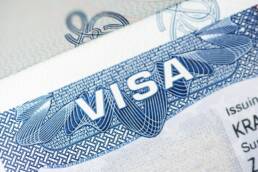The U.S. government has limited the issuance of new H-1B visas to 65,000 per fiscal year, also known as the “cap.” Petitioning Employers may submit a new H-1B Petition on April 1st for employment to begin on October 1st. Usually, the demand for new H-1B visas far exceeds 65,000 and the submitted Petitions are entered into a lottery for selection and adjudication.
However, certain H-1B Petitioning Employers are “cap-exempt”, meaning that their Petitions are not subject to the numerical limitation and as such, new employees can begin at any time during the year.
Cap-exempt Petitioning Employers must be either:
- An accredited institution of higher education in the United States;
- A non-profit research or government organization; or
- A non-profit organization associated with an accredited institution of higher education.
The first two categories are straightforward, requiring that the Petitioning Employer evidence their accreditation or non-profit research status and the H-1B Petition will be considered cap-exempt.
The third category, under which many medical professionals fall, has a bit more nuance.
In order to apply for Cap Exempt H-1B status, the Petitioning Employer must be able to prove that:
- It is a non-profit entity, such as through its IRS tax status and incorporation documentations;
- It is affiliated with an accredited institution of higher learning, through an Affiliation Agreement with the institution and evidence of its accreditation; and
- That the H-1B Beneficiary’s position is in furtherance of the purpose of the Affiliation Agreement.
As an example, a doctor working for a non-profit hospital who will be assisting in the training of medical residents from affiliated accredited institution of higher learning would qualify as an H-1B, because the purpose of the Affiliation Agreement is for the training of medical students from the affiliated institution and the physician’s role will further that purpose by assisting in the training of those students.
Berardi Immigration Law is happy to review your Affiliation Agreement and position offered to determine whether it qualifies for a cap-exempt H-1B
H-1B Filing Process
There are a number of requirements a Petitioning Employer must fulfill in order to file an H-1B Petition. The first step is to make a Prevailing Wage Determination in accordance with U.S. Department of Labor regulations and a Labor Certification Application (“LCA”) must then be filed.
The Prevailing Wage, for H-1B purposes, is the rate being paid in similar positions in a particular metropolitan statistical area for the same occupation. The foreign worker cannot be paid less than the prevailing wage as determined by the Department of Labor.
The purpose of the Prevailing Wage Determination is two-fold. First, it is meant to ensure that U.S. wages are not depressed by the hiring of foreign labor; and second, to protect foreign workers from exploitation.
The Petitioning Employer makes specific representations regarding the conditions under which the foreign worker was hired and will be employed. These attestations are as follows:
- The employer will pay the required wage, which is the greater of the prevailing wage or the actual wage paid to other employees in the same position;
- The employment of H-1B workers will not adversely affect the working conditions of US workers;
- When the LCA was filed, there was no strike, lockout or other work stoppage because of a labor dispute; and
- The H-1B worker will be given a copy of the LCA and the employer has notified the bargaining representative if the job is unionized, or if not, has posted a notice in a conspicuous place that an LCA was filed.
Anticipated processing time to obtain LCA certification is approximately five (5) to ten (10) working days (not counting weekends or government holidays).
Once the LCA is certified, the Petitioning Employer submits an H-1B Petition, including the certified LCA, to the Department of Homeland Security for adjudication. This Petition includes background information about the Petitioning Employer, a description of the job duties and requirements, and a narrative on the qualifications of the foreign national. Berardi Immigration Law carefully crafts these Petitions to clearly evidence that the position has been appropriately categorized for the purposes of the Prevailing Wage Determination and that the foreign national’s credentials meet or exceed the minimum qualifications necessary to hold that position.
Please call Berardi Immigration Law today to discuss this process in more depth!
Ready to have Berardi on your side?
Whether you’re a business looking to hire or a professional hoping to relocate, immigration law can be complicated. But you don’t have to do it alone. Put our experience to work for you.



